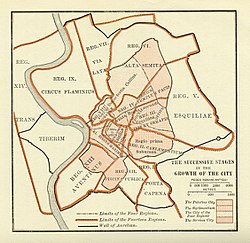Roman Kingdom
| Roman Kingdom | ||||||||||
| Regnum Romanum | ||||||||||
|
||||||||||
|
The ancient quarters of Rome.
|
||||||||||
| Capital | Rome | |||||||||
| Languages | Old Latin | |||||||||
| Religion | Roman religion | |||||||||
| Government | Elective monarchy | |||||||||
| King | ||||||||||
| • | 753–716 BC | Romulus | ||||||||
| • | 715–673 BC | Numa Pompilius | ||||||||
| • | 673–642 BC | Tullus Hostilius | ||||||||
| • | 642–616 BC | Ancus Marcius | ||||||||
| • | 616–579 BC | L. Tarquinius Priscus | ||||||||
| • | 578–535 BC | Servius Tullius | ||||||||
| • | 535–509 BC | L. Tarquinius Superbus | ||||||||
| Legislature | King, Roman Assemblies and Senate | |||||||||
| Historical era | Iron Age | |||||||||
| • | Founding of Rome | 753 BC | ||||||||
| • | Monarchy overthrown | 509 BC | ||||||||
|
||||||||||
| Today part of |
|
|||||||||
The Roman Kingdom (Latin: Rēgnum Rōmānum; Classical Latin: [ˈreːŋ.nũː roːˈmaː.nũː]) was the period of the ancient Roman civilization characterized by a monarchical form of government of the city of Rome and its territories.
Little is certain about the history of the kingdom, as nearly no written records from that time survive, and the histories about it that were written during the Republic and Empire are largely based on legends. However, the history of the Roman Kingdom began with the city's founding, traditionally dated to 753 BC with settlements around the Palatine Hill along the river Tiber in Central Italy, and ended with the overthrow of the kings and the establishment of the Republic in about 509 BC.
The site of the founding of the Roman Kingdom and eventual Republic and Empire had a ford where the Tiber could be crossed. The Palatine Hill and hills surrounding it presented easily defensible positions in the wide fertile plain surrounding them. All of these features contributed to the success of the city.
...
Wikipedia


